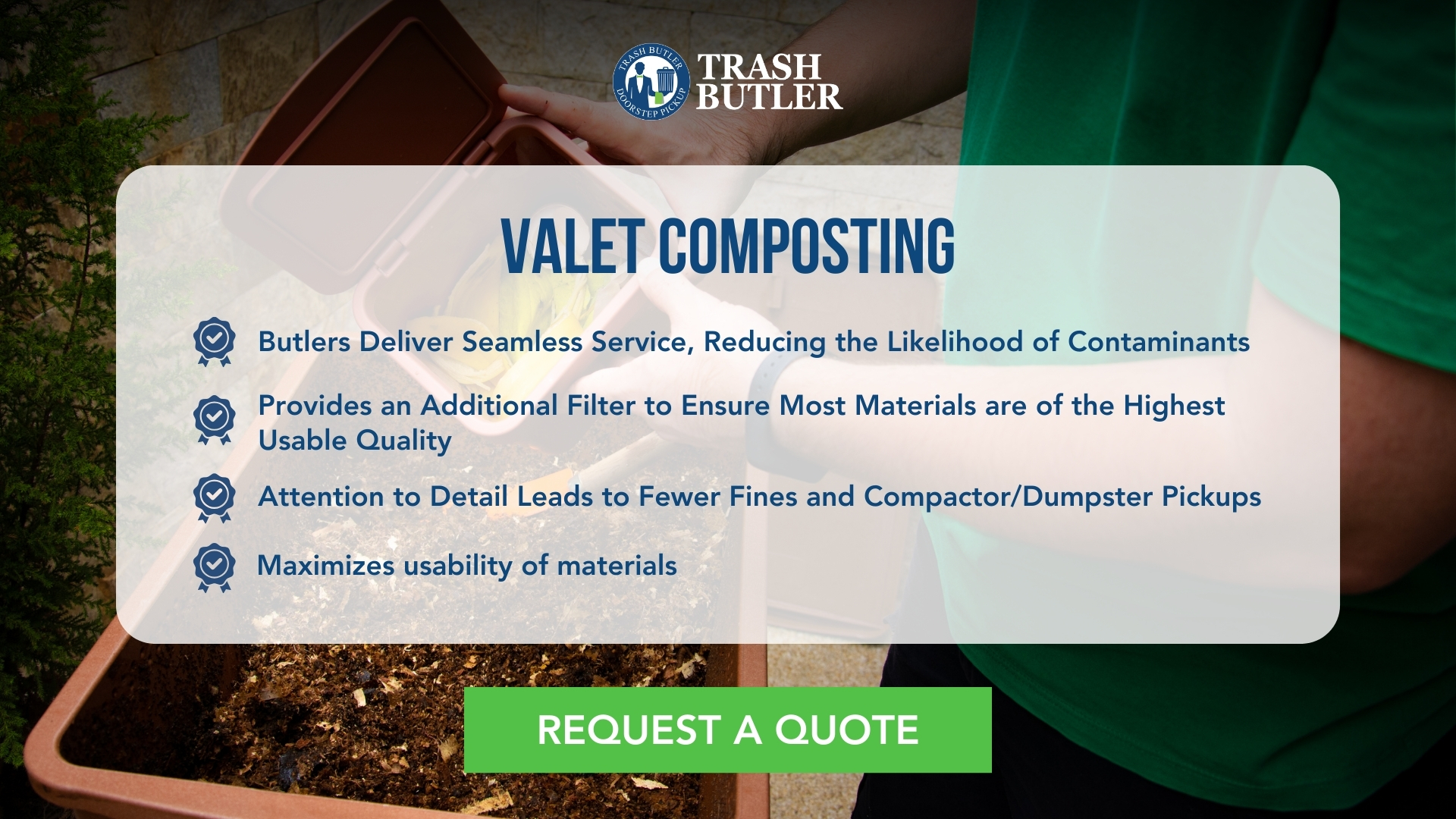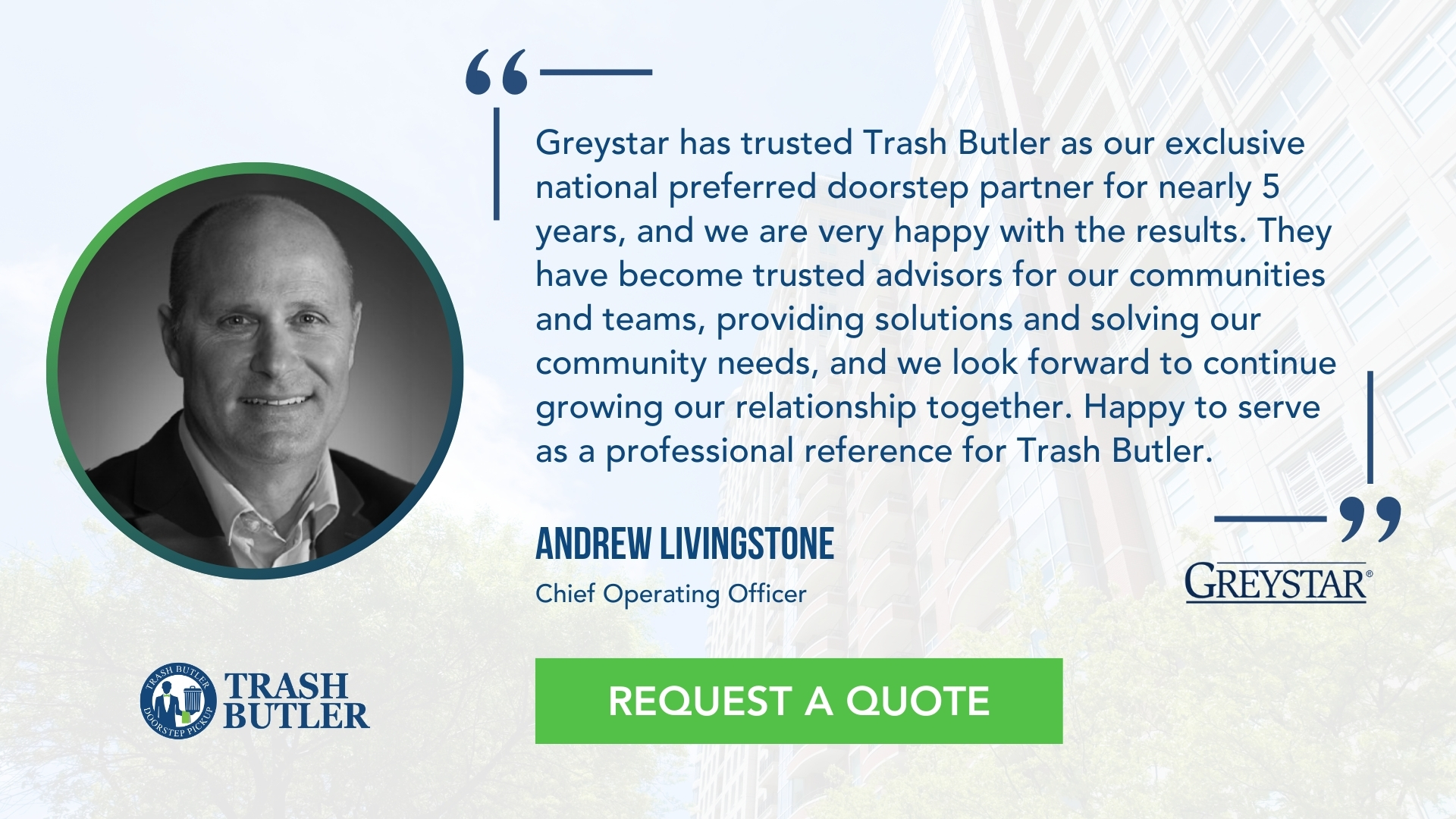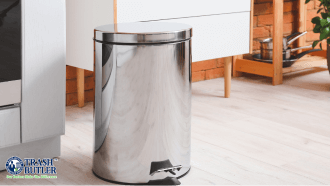As the push for sustainability and eco-friendly practices continues to gain momentum, many individuals living in multi-family apartment communities are seeking ways to reduce their environmental footprint. One effective and simple way to contribute to a greener world is by incorporating composting into your daily routine, even in a limited living space like an apartment.
This article will explore the benefits of composting, practical tips for setting up a composting system in an apartment, and how Trash Butler™ can assist multi-family apartment communities in their sustainability efforts. Join us as we explore the transformative potential of composting within apartment living, revolutionizing waste management one household at a time.

Composting for apartments refers to the practice of converting organic waste generated in apartment living spaces into nutrient-rich compost. Unlike traditional composting methods often utilized in suburban or rural settings, composting for apartments typically involves compact systems and specialized techniques tailored to the limited space and unique challenges of urban environments.
This sustainable practice helps apartment dwellers reduce their ecological footprint by diverting organic waste from landfills. It also produces valuable compost that can enrich soil for gardening, indoor plants, or community green spaces.
Composting in an apartment setting may seem challenging, but the numerous benefits are worth the effort. Here are some key advantages of incorporating composting into apartment living:
Composting helps reduce the amount of waste that ends up in landfills. Organic waste in landfills produces methane gas, a greenhouse gas that contributes to climate change. By composting food scraps and yard waste, apartment dwellers can significantly reduce their carbon footprint and promote sustainability.
Composting produces nutrient-rich soil that can be used for gardening, potted plants, or landscaping around the apartment complex. This natural fertilizer enriches the soil, improves soil structure, and promotes plant growth. Residents can enjoy healthier plants and flowers without the need for synthetic fertilizers.
Composting can lead to cost savings for both residents and property managers. By diverting organic waste from the trash, apartments can reduce waste management costs associated with hauling and disposal. In addition, the nutrient-rich compost produced can replace store-bought fertilizers, saving money on landscaping and gardening supplies.
Composting can foster a sense of community among apartment residents. Setting up a communal composting area or organizing composting workshops can bring neighbors together with a shared environmental goal. This sense of community can enhance resident satisfaction and engagement within the apartment complex.
By composting in apartments, residents demonstrate their commitment to sustainable living practices. This eco-friendly behavior can inspire others in the community to adopt similar green habits, creating a culture of environmental responsibility within the apartment complex.
Incorporating composting into apartment living offers a range of benefits that contribute to a healthier environment, cost savings, community engagement, and sustainable living practices for residents and property managers alike.
Composting in an apartment doesn’t require a lot of space or fancy equipment. With a few essential tools, you can start reducing your waste and creating nutrient-rich soil for your plants. Here are some key items to help you kickstart your apartment composting journey:
With these essential tools in hand, you’ll be well-equipped to start composting in your apartment and positively impact the environment. Remember, every small step counts towards a greener future!
When composting in apartments, there are several best practices to keep in mind to ensure a successful and efficient process. Here are some tips to help you effectively compost in a small living space:
Selecting the appropriate composting method for your apartment requires considering various factors, including available space, time commitment, odor concerns, and personal preferences. Here are some popular composting methods suited for apartment living:
Ideal for compact spaces, indoor worm bins utilize composting worms, such as red wigglers, to break down organic waste quickly. These bins can be kept under sinks or closets and require minimal maintenance. The worms efficiently process food scraps, producing nutrient-rich worm castings that can be used as fertilizer.
Bokashi composting is a method that utilizes a special type of bacteria to ferment kitchen waste instead of decomposing it. This anaerobic process allows for the breakdown of various food scraps, including meat and dairy products. Bokashi bins are airtight, making them suitable for apartments as they don’t produce any odors. Once the fermentation process is complete, the waste can be buried in the soil to finish composting.
Electric composters are an excellent choice for a more high-tech composting solution. These compact appliances use heat, agitation, and sometimes even enzymes to break down organic material quickly. They work well in small spaces and are relatively low-maintenance, requiring minimal effort from the user.
Some apartments may have access to outdoor spaces, such as balconies or patios, where compact composters like tumblers or bins can be used. These systems require a bit more space but offer efficient composting of kitchen scraps and garden waste. Look for models designed for small spaces and easy management.
If individual composting methods don’t suit your lifestyle, consider joining a community composting program. Many cities and neighborhoods have communal compost bins where residents can drop off food scraps. This option is great for apartment dwellers who lack the time or resources to compost independently.
Whichever method you choose, incorporating composting into your apartment living can contribute to a more sustainable lifestyle and reduce your waste output.
Whatever method you choose, incorporate composting into your At Trash Butler™, we believe in making sustainable choices easy for multi-family apartment communities. Our valet trash service includes compost collection to help residents reduce their environmental impact effortlessly. Partner with us to make a difference in your community today!
Composting in apartments can offer numerous benefits. However, one common concern among apartment dwellers regarding composting is managing odors. Proper odor control strategies ensure a fresh and pleasant living environment.
Invest in a sealable container specifically designed for composting. These containers have airtight lids that help trap odors inside, preventing them from escaping into your living space.
When adding food scraps to your compost bin, utilize a layering technique. Alternate between dry materials like shredded paper or leaves and wet materials like vegetable peels or coffee grounds. This balance can help reduce moisture levels and minimize odors.
Frequently turn or mix the contents of your compost bin to aerate the materials. This process helps accelerate decomposition and prevents the formation of foul odors.
Add odor-neutralizing agents like baking soda, activated charcoal, or composting worms to your compost bin. These agents can help absorb odors and balance the pH levels of the compost.
Ensure adequate ventilation in the area where you keep your compost bin. Good airflow can help prevent the buildup of stagnant air and reduce the intensity of any odors.
Composting is a simple yet impactful way to reduce waste and promote a greener lifestyle, even for those living in apartments. With a few easy steps, residents can incorporate composting into their daily routine, contributing to a more sustainable environment.
As more individuals and communities recognize the importance of sustainable living practices, composting has emerged as a simple yet impactful way to reduce waste and nourish the environment. For residents of multi-family apartment communities, the convenience and benefits of composting are now more accessible than ever.
Trash Butler™ is a leading expert in sustainability solutions for apartments. We provide a revolutionary doorstep valet trash service that includes composting options. By partnering with us, property managers can offer residents a hassle-free composting solution that helps divert organic waste from landfills, reduce greenhouse gas emissions, and create nutrient-rich soil for gardens or landscaping projects.
Join us in the composting revolution and let our Butlers lead towards a cleaner, more sustainable world. Request a quote or contact us today to learn how Trash Butler™ can help your property embrace composting and sustainability.

You only need a little space to start composting in an apartment setting. A small bin placed under the kitchen sink, on a balcony, or in a utility area is usually sufficient. The bin size can vary, but a container roughly the volume of a standard kitchen trash bin is a good starting point.
Yes. The compost produced from your apartment composting efforts is rich in nutrients and can be an excellent fertilizer for outdoor gardens and indoor plants. It helps improve soil structure, moisture retention, and plant growth.
Yes, you can compost in a rental property, but it’s advisable to check with your landlord or property management first. Some properties may have specific guidelines or might even offer composting as part of their waste management services.
Turning or aerating your compost helps speed up the process and prevent odor build-up. For apartment composting systems, turning the compost once a week is recommended to ensure adequate aeration.
It’s generally not recommended to compost pet waste in apartment composting systems, especially from omnivores like dogs and cats, due to health concerns and the potential for unpleasant odors. Instead, look for pet waste-specific composting solutions or disposal methods.
While regulations can vary by location, most apartment composting efforts shouldn’t violate regulations if they’re managed properly. However, it’s a good idea to review any local regulations regarding waste management or consult with your property management to ensure compliance.
Mix green materials (like kitchen scraps) and brown materials (like shredded paper or dead leaves) to keep your compost balanced. Also, proper moisture levels must be maintained, and the bin should be aerated regularly to provide oxygen for the composting process.
If done correctly, composting should not produce unpleasant odors. To minimize smells, ensure a proper balance of materials in your compost, avoid composting meat and dairy products, and regularly turn your compost to incorporate fresh air.
Indicators of effective composting include:
Additionally, the compost should be slightly warm, indicating microbial activity.
While incentives can vary by location, some municipalities offer rebates, tools, or resources to encourage composting. Check with your local waste management authority or environmental services department to explore any programs that may support apartment composting initiatives.

Why Valet Trash Services Are Essential For Orlando Apartments
Discover why valet trash for apartments in Orlando is essential. Enhance resident satisfaction and property value with top-notch valet trash…

Why Valet Trash Services Are Essential For Orlando Apartments
Discover why valet trash for apartments in Orlando is essential. Enhance resident satisfaction and property value with top-notch valet trash…

Everything Property Managers Need To Know About Doorstep Trash Pickup
Essential guide for property managers on doorstep trash pickup for apartments. Improve tenant satisfaction and streamline operations with…